Podcast
Questions and Answers
What is the main function of a conjunction in grammar?
What is the main function of a conjunction in grammar?
A conjunction connects words, phrases, or clauses to form a sentence or join separate sentences.
Which type of conjunction connects words, phrases, or clauses of equal importance?
Which type of conjunction connects words, phrases, or clauses of equal importance?
- Coordinating Conjunctions (correct)
- Subordinating Conjunctions
- Correlative Conjunctions
- None of the above
Which of the following are examples of coordinating conjunctions?
Which of the following are examples of coordinating conjunctions?
- and, but, or, so, yet (correct)
- because, since, after, although, if, unless, until
- both…and, either…or, not only…but also
- None of the above
What do subordinating conjunctions connect?
What do subordinating conjunctions connect?
Which of the following are examples of subordinating conjunctions?
Which of the following are examples of subordinating conjunctions?
How do correlative conjunctions differ from other conjunctions?
How do correlative conjunctions differ from other conjunctions?
Which of the following are examples of correlative conjunctions?
Which of the following are examples of correlative conjunctions?
What is one way that conjunctions can help clarify meaning?
What is one way that conjunctions can help clarify meaning?
The conjunction "for" is used to show contrast.
The conjunction "for" is used to show contrast.
The conjunction "since" is used to show a cause-and-effect relationship.
The conjunction "since" is used to show a cause-and-effect relationship.
Which conjunction is the most common type of conjunction when joining phrases?
Which conjunction is the most common type of conjunction when joining phrases?
The conjunction "yet" is used to bring a sense of surprise or unexpected contrast.
The conjunction "yet" is used to bring a sense of surprise or unexpected contrast.
Which of the following is the best example of a sentence using a correlative conjunction?
Which of the following is the best example of a sentence using a correlative conjunction?
Flashcards
Conjunction
Conjunction
A word that connects words, phrases, or clauses to form a sentence or join separate sentences.
Coordinating Conjunction
Coordinating Conjunction
Connects words, phrases, or clauses of equal importance.
Coordinating Conjunction Examples
Coordinating Conjunction Examples
Words like 'and', 'but', 'or', 'so', 'yet'.
Subordinating Conjunction
Subordinating Conjunction
Signup and view all the flashcards
Subordinating Conjunction Examples
Subordinating Conjunction Examples
Signup and view all the flashcards
Correlative Conjunction
Correlative Conjunction
Signup and view all the flashcards
Correlative Conjunction Examples
Correlative Conjunction Examples
Signup and view all the flashcards
Function - Joining words/phrases
Function - Joining words/phrases
Signup and view all the flashcards
Function - Connecting clauses
Function - Connecting clauses
Signup and view all the flashcards
Function - Showing relationships
Function - Showing relationships
Signup and view all the flashcards
Function - Clarifying meaning
Function - Clarifying meaning
Signup and view all the flashcards
Common Conjunctions
Common Conjunctions
Signup and view all the flashcards
Study Notes
Conjunctions
- Conjunctions are words that connect words, phrases, or clauses to create sentences or join separate sentences. They link ideas, show relationships, and clarify meaning.
Types of Conjunctions
Coordinating Conjunctions
- Connect words, phrases, or clauses of equal importance.
- Examples: and, but, or, so, yet
- Example: "I like reading books, and I also enjoy watching movies."
Subordinating Conjunctions
- Connect a dependent clause to an independent clause.
- Examples: because, since, after, although, if, unless, until
- Example: "I went to the store because I needed milk."
Correlative Conjunctions
- Used in pairs to connect words or phrases of equal importance.
- Examples: both...and, either...or, not only...but also
- Example: "I like both coffee and tea."
Functions of Conjunctions
- Join words/phrases to form a sentence.
- Connect clauses (independent or dependent).
- Show relationships (cause-and-effect, contrast, addition).
- Clarify sentence structure for better understanding.
Common Conjunctions
- and
- but
- or
- so
- yet
- for
- nor
- because
- since
- after
Studying That Suits You
Use AI to generate personalized quizzes and flashcards to suit your learning preferences.




